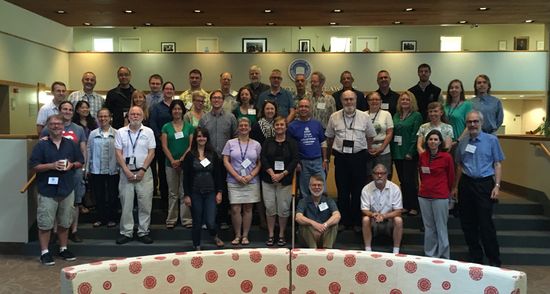Digitizing the 2nd largest Invertebrate Phylum: Mollusks: Difference between revisions
| Line 39: | Line 39: | ||
==Collection Posters== | ==Collection Posters== | ||
[https://www.idigbio.org/wiki/images/7/74/2017-07_Poster_RECOLNAT.pdf Museum national d'Histoire naturelle] | *[https://www.idigbio.org/wiki/images/7/74/2017-07_Poster_RECOLNAT.pdf Museum national d'Histoire naturelle] | ||
[https://www.idigbio.org/wiki/images/5/5f/AMNH-MolluskWorkshop_Poster.pdf American Museum of Natural History] | *[https://www.idigbio.org/wiki/images/5/5f/AMNH-MolluskWorkshop_Poster.pdf American Museum of Natural History] | ||
[https://www.idigbio.org/wiki/images/7/77/BIC_MolluskDigitizationPoster2017_final.pdf Scripps Institution of Oceanography] | *[https://www.idigbio.org/wiki/images/7/77/BIC_MolluskDigitizationPoster2017_final.pdf Scripps Institution of Oceanography] | ||
[https://www.idigbio.org/wiki/images/2/2c/Bailey-Matthews_National_Shell_Museum_LEAL_17-06_Technical_Poster_24x30_PRESS.pdf Bailey-Matthews National Shell Museum] | *[https://www.idigbio.org/wiki/images/2/2c/Bailey-Matthews_National_Shell_Museum_LEAL_17-06_Technical_Poster_24x30_PRESS.pdf Bailey-Matthews National Shell Museum] | ||
[https://www.idigbio.org/wiki/images/b/bf/Buffalo_Museum_of_Science_Porto-Hannes_Poster_July17_2017.pdf Buffalo Museum of Science] | *[https://www.idigbio.org/wiki/images/b/bf/Buffalo_Museum_of_Science_Porto-Hannes_Poster_July17_2017.pdf Buffalo Museum of Science] | ||
[https://www.idigbio.org/wiki/index.php/File:Burke-AMS_Digitization_Workshop.pdf Burke Museum of Natural History and Culture] | *[https://www.idigbio.org/wiki/index.php/File:Burke-AMS_Digitization_Workshop.pdf Burke Museum of Natural History and Culture] | ||
[https://www.idigbio.org/wiki/images/a/a9/CMN_Digitizing_Mollusc_Workshop_Poster_FINAL.pdf Canadian Museum of Nature] | *[https://www.idigbio.org/wiki/images/a/a9/CMN_Digitizing_Mollusc_Workshop_Poster_FINAL.pdf Canadian Museum of Nature] | ||
[https://www.idigbio.org/wiki/images/a/ae/FLMNHCollections_Slapcinsky.pdf Florida Museum of Natural History] | *[https://www.idigbio.org/wiki/images/a/ae/FLMNHCollections_Slapcinsky.pdf Florida Museum of Natural History] | ||
[https://www.idigbio.org/wiki/images/3/39/INHS-AMS_2017_Cummings_%26_Vinsel.pdf Illinois Natural History Survey] | *[https://www.idigbio.org/wiki/images/3/39/INHS-AMS_2017_Cummings_%26_Vinsel.pdf Illinois Natural History Survey] | ||
[https://www.idigbio.org/wiki/images/8/82/SBMNH_valentich-scott.pdf Santa Barbara Museum of Natural History] | *[https://www.idigbio.org/wiki/images/8/82/SBMNH_valentich-scott.pdf Santa Barbara Museum of Natural History] | ||
[https://www.idigbio.org/wiki/images/2/21/Schiele_Poster_2.pdf The Schiele Museum of Natural History] | *[https://www.idigbio.org/wiki/images/2/21/Schiele_Poster_2.pdf The Schiele Museum of Natural History] | ||
[https://www.idigbio.org/wiki/images/0/08/The_mollusk_collection_of_FMNH.pdf Field Museum of Natural History] | *[https://www.idigbio.org/wiki/images/0/08/The_mollusk_collection_of_FMNH.pdf Field Museum of Natural History] | ||
[https://www.idigbio.org/wiki/images/0/06/UCMP_Recent_Mollusks_Poster_edit_HCVer02_Jul11.pdf University of California Museum of Paleontology] | *[https://www.idigbio.org/wiki/images/0/06/UCMP_Recent_Mollusks_Poster_edit_HCVer02_Jul11.pdf University of California Museum of Paleontology] | ||
[https://www.idigbio.org/wiki/images/6/6c/UMMZ-AMS2017TaehwanLee.pdf University of Michigan Mueum of Zoology] | *[https://www.idigbio.org/wiki/images/6/6c/UMMZ-AMS2017TaehwanLee.pdf University of Michigan Mueum of Zoology] | ||
Revision as of 11:52, 17 July 2017
Mollusks are the 2nd most species rich invertebrate phylum on the planet. In the US there are approximately 55 reported mollusks collections housed in a great diversity of small, midsized, and large collections. However, there are numerous smaller, heretofore largely unknown ‘shell’ collections containing North American specimens in various museums that are not known to the research and environmental research communities. This proposed taxon focus digitization workshop will assemble a solid data foundation on the current status of US mollusk collections digitization, develop advancement strategies for rapidly promoting digitization and mobilization of North American molluscan specimen data, and provide georeferencing training covering key issues in terrestrial, aquatic, and marine localities, with special relevance to the phylum. The research use of digitized mollusk data and various applications by other stakeholder forms a prominent component of this workshop. The workshop will last 1.5 days and will be conducted in connection with the Annual Meeting of the American Malacological Society in July 2017 hosted by the Delaware Museum of Natural History in Wilmington, DE.
General Information
Dates: July 16-17, 2017
Location: University of Delaware
Workshop Facilitators: Petra Sierwald and Liz Shea
Live Broadcast
http://idigbio.adobeconnect.com/mollusks/
Logistics
Breakout Group Reports
- 1. Digitizing by preparation type
- 2. Data entry, workflow
- 3. Adding new data to old records
- 4.Data Quality Assurance/Quality Control (QA/QC)
- 5. Collaboration, dissemination, feedback
Group Notes
Workshop Recordings
- Day1 8:30-10:30am
- Day1 11am-12:10pm
- Breakout Group Report Backs
- Day1 Discussion: How can we standardize and find efficiencies?
Collection Posters
- Museum national d'Histoire naturelle
- American Museum of Natural History
- Scripps Institution of Oceanography
- Bailey-Matthews National Shell Museum
- Buffalo Museum of Science
- Burke Museum of Natural History and Culture
- Canadian Museum of Nature
- Florida Museum of Natural History
- Illinois Natural History Survey
- Santa Barbara Museum of Natural History
- The Schiele Museum of Natural History
- Field Museum of Natural History
- University of California Museum of Paleontology
- University of Michigan Mueum of Zoology
